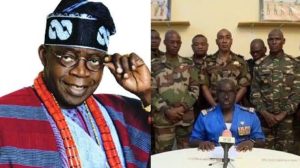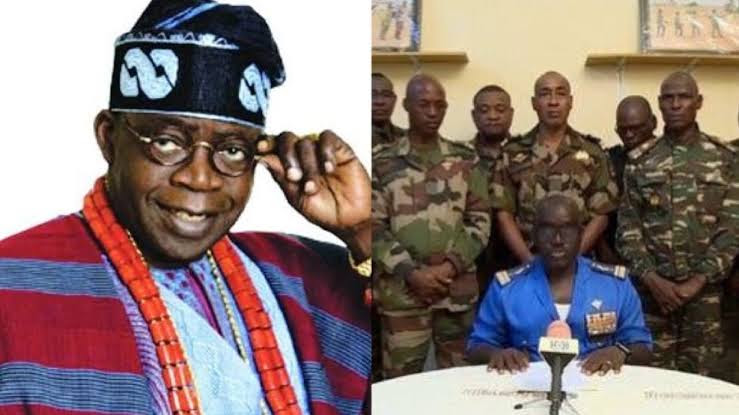
Implications Of Using Military Solution To Resolve The Coup In Niger:The Gains And Pains
![]()
Implications Of Using Military Solution To Resolve The Coup In Niger:The Gains And Pains
By Frank Odinukaeze
Barely twenty four hours to the expiration of the ultimatum given by president Bola Tinubu led ECOWAS leaders to the military juntas in Niger to restore democracy,by restoring the ousted Nigerean democratically elected president,Mohamed Bazoum,the Whole World is anxiously waiting to see if the ECOWAS leaders, would walk the talk,even as the military juntas have warned against interference in what they called Niger’s internal affairs.
Indeed, ECOWAS’s resolve for military solution, came against the backdrops of the recent coup d’etat in Niger, which toppled the democratically elected president Mohamed Bazoum and suspended the constitution, this sparking a strong reaction from the regional bloc ECOWAS.
The Economic Community of West African States (ECOWAS) has threatened to use force to restore constitutional order in Niger if the coup leaders do not comply with its ultimatum by Sunday, August 6. ECOWAS has also imposed sanctions on Niger, including closing its borders, suspending trade and financial transactions, and freezing the assets of the coup plotters.
While ECOWAS has expressed its commitment to defend democracy and peace in West Africa, its plan for a potential military intervention in Niger raises several questions and challenges. What are the implications of using force to reverse the coup? What are the risks and opportunities for regional stability and security? How will the intervention affect the relations between ECOWAS and other external actors, such as France, the US, Russia, and China? All these are fundamental issues the ECOWAS leaders would ha e to deal with as the clocks ticks to the August 6 deadline.
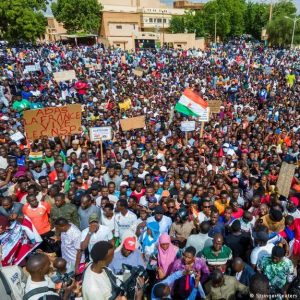
Meanwhile the ECOWAS plans suffered a set back last Friday following the Nigerian Senate’s rejection of president Tinubu’s letter to the House.
President Tinubu had written the Upper House seeking for approval for Military intervention in the troubled West African State.
The letter read, “Following the unfortunate political situation in Niger Republic culminating in the overthrow of its President, ECOWAS under my leadership condemned the coup in its entirety and resolved to seek the return of the democratically elected govt. in a bid to restore peace, ECOWAS convened a meeting and came out with a communique.
“Closure and monitoring of all land borders with the Niger Republic and reactivating of the border drilling exercise.
” Cutting off Electricity supply to the Niger Republic. Mobilizing international support for the implementation of the provisions of the ECOWAS communique
“Preventing the operation of commercial and special flights into and from Niger Republic.
“Blockade of goods in transit to Niger especially from Lagos and eastern seaports.
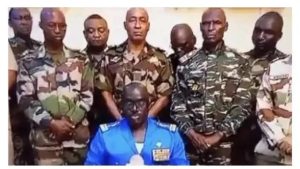
“Embarking on sensitization of Nigerians and Nigerians on the imperative of these actions, particularly via social media.
“Military build-up and deployment of personnel for military intervention to enforce compliance of the military junta in Niger should they remain recalcitrant.”
In a swift reaction after the President of the Senate read the communication from President Tinubu, former deputy Senate majority leader, Abdul Ningi, PDP, Bauchi Central ,raised a constitutional point of order to draw the attention of the Senate to the provisions of the Senate that show how the armed forces could be deployed on combat duty outside Nigeria.
According to Ningi, his point of order was aimed at guiding the Senate on the matter.
Ningi read section 5(5) of the Constitution which states that “Notwithstanding the provisions of subsection (4) of this section, the President, in consultation with the National Defence Council, may deploy members of the armed forces of the Federation on a limited combat duty outside Nigeria if he is satisfied that the national security is under imminent threat or danger provided that the President shall, within seven days of actual combat engagement, seek the consent of the Senate and the Senate shall thereafter give or refuse the said consent within 14 days.”
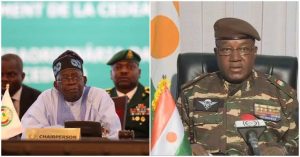
The Senate in rejecting the request of President Bola Tinubu asked the Chairman of the Economic Community of West African States, and other leaders of the region to tread with caution in addressing the political quagmire in Niger Republic following the sack of the democratically elected administration of Mohamed Bazoum.
Rising from a closed-door session that lasted close to two hours to discuss the letter written to the Senate on Friday by President Bola Tinubu on the decisions taken by the regional body, the Senate asked ECOWAS and its leaders to strengthen political and diplomatic options and other means with a view to resolving the political situation in Niger Republic.
The Senate while condemning the Niger coup in totality, commended the chairman, President Tinubu and other Heads of State of the other States of ECOWAS for their prompt response and the positions taken on what it described as the unfortunate development in Niger Republic.
Reading the resolutions of the Senators after the meeting, the President of the Senate, Senator Godswill Akpabio said that “the Senate recognizes that President Tinubu via his correspondence has not asked for the approval of the parliament of this Senate to go to war as erroneously suggested in some quarters.
“Rather Mr President has expressed a wish to respectfully solicit the support of the National Assembly in the successful implementation of the resolutions of the ECOWAS as outlined in the said communication.
“The Senate calls on the president of the Federal Republic of Nigeria as the chairman of ECOWAS to further encourage other leaders of ECOWAS to strengthen political and diplomatic options and other means with a view to resolving the political compass in Niger Republic.
“The leadership of the Senate is mandated to further engage with the president and commander in chief on behalf of the Senate and the entire National Assembly on how best to resolve the issue in view of the hitherto existing cordial relationship between Nigereans and Nigerians.
“Finally, the Senate calls on the ECOWAS parliament to rise to the occasion by equally condemning this coup and also positing solutions to resolving this compass as soon as possible.”
Indeed,using force to reverse the coup in Niger could have both positive and negative implications for the country and the region. On the one hand, a successful military intervention could deter future coups and send a clear message that ECOWAS will not tolerate any violation of democratic principles and norms. It could also restore legitimacy and confidence in the elected government of Bazoum, who won the presidential election in February 2021 with 55.75% of the votes
Bazoum is seen as a key ally of ECOWAS and the international community in the fight against terrorism and insecurity in the Sahel region.
On the other hand, a military intervention could also trigger a violent backlash from the coup plotters and their supporters, who have rallied in the streets of Niamey to celebrate the overthrow of Bazoum. The intervention could escalate the conflict and cause more casualties and displacement among civilians. It could also worsen the humanitarian situation in Niger, which is already facing multiple crises, such as food insecurity, malnutrition, floods, droughts, and Covid-19. Moreover, a military intervention could undermine the national dialogue and reconciliation process that ECOWAS has called for between the coup leaders and the political parties. It could also create resentment and mistrust among some segments of the population who may perceive ECOWAS as an external aggressor or a puppet of foreign interests.
A military intervention in Niger could also have significant implications for regional stability and security. On one hand, it could enhance ECOWAS’s role and credibility as a regional peacekeeper and mediator. It could demonstrate ECOWAS’s capacity and willingness to act decisively and collectively to address security threats and challenges in West Africa. It could also strengthen ECOWAS’s cooperation and coordination with other regional organizations, such as the African Union (AU) and the United Nations (UN), which have both condemned the coup and supported ECOWAS’s efforts to resolve the crisis .
Further more, a military intervention could also pose serious risks and challenges for ECOWAS and its member states. It could strain ECOWAS’s resources and capabilities, which are already overstretched by other ongoing conflicts and crises in the region, such as Mali, Burkina Faso, Nigeria, Guinea-Bissau, Liberia, Sierra Leone, Côte d’Ivoire, Guinea, Togo, Benin, Ghana, Senegal, Gambia, Cape Verde. It could also expose ECOWAS’s troops to attacks from various armed groups operating in Niger, such as Boko Haram, Islamic State West Africa Province (ISWAP), Al-Qaeda in the Islamic Maghreb (AQIM), Ansar Dine, Movement for Oneness and Jihad in West Africa (MUJAO), among others. Furthermore, a military intervention could complicate ECOWAS’s relations with other external actors who have interests and influence in Niger and the Sahel region.
A military intervention in Niger could also affect ECOWAS’s relations with external actors who have stakes in Niger and the Sahel region. These include France, which has about 5,100 troops deployed in Operation Barkhane to combat terrorism in Mali, Niger, Burkina Faso, Chad, and Mauritania; the US, which has about 800 troops stationed in Niger to provide intelligence and logistical support to France and other partners; Russia, which has been accused of backing Wagner Group mercenaries to support rebel groups in Mali; China, which has invested heavily in infrastructure projects and mining operations in Niger; among others.
It is also possible that a military intervention in Niger could create opportunities for ECOWAS to enhance its partnership and collaboration with some of these external actors, especially those who share its vision and values of democracy, peace, and security in the region. For instance, France, the US, and the EU have expressed their support for ECOWAS’s efforts to resolve the crisis in Niger and restore constitutional order . They have also offered to provide humanitarian and security assistance to Niger and ECOWAS .
On the other hand, a military intervention in Niger could also generate tensions and conflicts with some of these external actors, especially those who have divergent or competing interests and agendas in the region. For instance, Russia has denounced ECOWAS’s threat of using force as a violation of Niger’s sovereignty and an interference in its internal affairs. Russia has also been accused of providing weapons and training to the coup plotters in Niger. China has also expressed its concern over the situation in Niger and called for a peaceful and inclusive solution through dialogue. China has also been accused of exploiting Niger’s natural resources and undermining its sovereignty and development.
In conclusion,as the ECOWAS ultimatum expires in few hours time the leaders of the regional block, should find a better alternative to military intervention in the present quarantine. A military intervention in Niger is a risky option for ECOWAS and the region. It could have both positive and negative implications for the country and the region. It could also create opportunities and challenges for ECOWAS’s relations with external actors. Therefore, ECOWAS should carefully weigh the costs and benefits of using force to reverse the coup in Niger. It should also explore other alternatives, such as diplomacy, dialogue, mediation, sanctions, incentives, among others. ECOWAS should also consult and coordinate with other regional and international partners who can support its efforts to restore democracy and peace in Niger. As the clock ticks towards the expiration of the ultimatum on August 6,It remains to be seen what other viable alternative the President Bola Tinubu led ECOWAS leaders would take to resolve the situation in Niger or stick to their gun.


